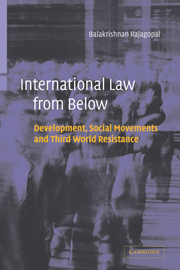Book contents
- Frontmatter
- Contents
- Abbreviations
- Preface and Acknowledgments
- Introduction
- PART I International law, development, and Third World resistance
- PART II International law, Third World resistance, and the institutionalization of development: the invention of the apparatus
- PART III Decolonizing resistance: human rights and the challenge of social movements
- 7 Human rights and the Third World: constituting the discourse of resistance
- 8 Recoding resistance: social movements and the challenge to international law
- 9 Markets, gender and identity: a case study of the Working Women's Forum as a social movement
- PART IV Epilogue
- References
- Index
9 - Markets, gender and identity: a case study of the Working Women's Forum as a social movement
from PART III - Decolonizing resistance: human rights and the challenge of social movements
Published online by Cambridge University Press: 09 July 2009
- Frontmatter
- Contents
- Abbreviations
- Preface and Acknowledgments
- Introduction
- PART I International law, development, and Third World resistance
- PART II International law, Third World resistance, and the institutionalization of development: the invention of the apparatus
- PART III Decolonizing resistance: human rights and the challenge of social movements
- 7 Human rights and the Third World: constituting the discourse of resistance
- 8 Recoding resistance: social movements and the challenge to international law
- 9 Markets, gender and identity: a case study of the Working Women's Forum as a social movement
- PART IV Epilogue
- References
- Index
Summary
This case study summarizes the findings of my field research with the Working Women's Forum (WWF), a large women's movement in South India. The research consisted of field visits over several years, extensive interviews during the entire period with the staff, members, and the leaders of the WWF, observatory research in the cooperatives, and research on extensive documentary materials and literature provided by the WWF. I also offer analysis of my findings in addition to locating them in the wider literature on social movements and development. The study concludes by noting the difficulty of placing the WWF within the received categories of international law and municipal law as well as the various ways in which the praxis of the WWF challenges received notions about economic development and human rights.
Description of the structure and activities of the WWF
The WWF was started in 1978 by its current President, Ms. Jaya Arunachalam, and several working women, primarily as a union of women in the informal sector with an initial membership of 800. Since then it has grown into a movement of 591,000 poor women in three southern states of India: Tamil Nadu, Karnataka, and Andhra Pradesh. Its operation reaches over 2,061 villages and 1,651 slums in 4,158 different areas organized into 45,000 groups in 15 branches. As such, it currently appears to be the largest women's movement in India, surpassing the better-known and much-studied Self-Employed Women's Association (SEWA).
- Type
- Chapter
- Information
- International Law from BelowDevelopment, Social Movements and Third World Resistance, pp. 272 - 288Publisher: Cambridge University PressPrint publication year: 2003



